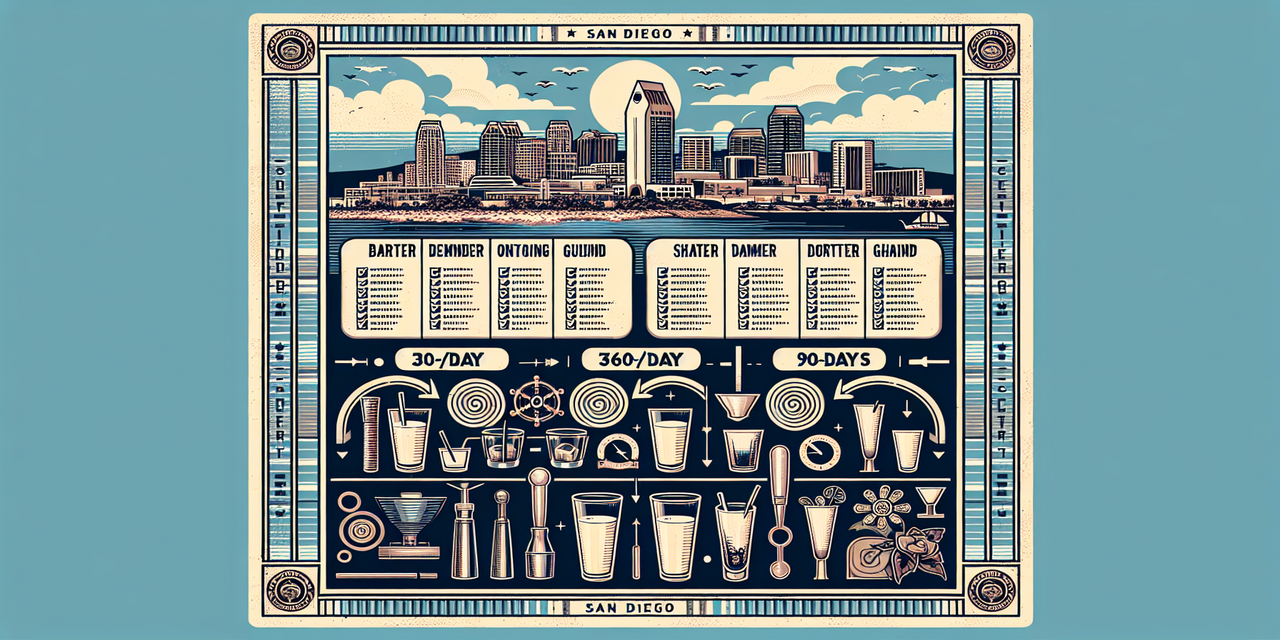Bartender Onboarding Guide for San Diego: Key Takeaways
- California requires bartenders to complete Responsible Beverage Service (RBS) certification within 60 days and maintain a Food Handler's Card within 30 days.
- A structured 30-/60-/90-day onboarding plan covers foundational skills, advanced mixology, and independent service.
- Checklists for each phase ensure new bartenders master compliance, operational proficiency, and customer service excellence.
Effective bartender onboarding in San Diego combines regulatory compliance, skill-building, and real-world experience.
Follow this 30-/60-/90-day plan with detailed checklists to successfully integrate new bartenders into your team.
If you’re hiring locally, share this guide on how to Become a San Diego bartender so candidates understand prerequisites.
1. 30-Day Bartender Onboarding Plan in San Diego: Foundation and Compliance
The first 30 days focus on establishing a solid foundation by orienting the new bartender to your establishment, ensuring they meet San Diego's legal requirements, and familiarizing them with basic bar operations.
Week 1: Orientation and Regulatory Training
Begin by introducing the bartender to your venue’s layout, mission, and core values to foster a sense of belonging and understanding of your culture.
Before day one, use these tips to Hire great bartenders who fit your service standards and brand.
Next, prioritize compliance training mandatory in California:
- Responsible Beverage Service (RBS) Certification: All bartenders must complete a state-approved RBS course and pass the exam within 60 days of hire. This certification, valid for three years, equips servers to responsibly manage alcohol service and avoid legal complications.
- Food Handler’s Card: Since bartenders handle garnishes and may serve food, they must obtain this card within 30 days by completing approved food safety training.
Week 2: Product Knowledge and Basic Mixology Skills
Familiarize the bartender with your beverage offerings, including cocktails, beers, wines, and non-alcoholic options.
Align training with core bartender responsibilities to make expectations clear from the start.
Teach standard pouring techniques, measurement accuracy, and garnish preparation to establish sound mixology fundamentals.
Week 3: Bar Setup and Equipment Proficiency
Train the bartender to organize their station for efficiency, including the arrangement of tools and inventory management.
Ensure they can competently use all essential bar equipment such as shakers, blenders, and the Point of Sale (POS) system to facilitate smooth service and to maintain bar tools.
Week 4: Customer Service Basics and Mock Service
Instill service standards emphasizing polite greetings, order accuracy, and workspace cleanliness.
Run mock service scenarios to build confidence, speed, and accuracy before live shifts.
For smooth front-of-house coordination, clarify the cocktail server role and handoff points.
2. 60-Day Bartender Onboarding Plan in San Diego: Skill Enhancement and Application
The following 30-day stage moves the bartender from foundational skills to real-world experience under supervision.
Weeks 5-6: Advanced Mixology and Efficiency Training
Introduce signature and complex cocktail recipes to expand the bartender’s drink repertoire.
Conduct speed drills that challenge them to prepare multiple drinks quickly and accurately, improving overall service flow and applying high-volume bartending techniques.
Weeks 7-8: Shadowing Experienced Bartenders with Feedback
Have the new bartender shadow seasoned team members during peak hours, learning customer interaction and multitasking.
Offer constructive critique sessions to help fine-tune their techniques and approach to service.
Introduce the support structure and outline barback responsibilities to improve flow during rushes.
3. 90-Day Bartender Onboarding Plan in San Diego: Autonomy and Continuous Improvement
In the final onboarding phase, the bartender gains full autonomy and engages in performance assessment and career planning.
Weeks 9-10: Independent Shifts and Problem-Solving
Let the bartender manage entire shifts solo, showcasing their proficiency in all areas from mixology to customer service.
Encourage them to resolve complaints and unexpected challenges confidently and effectively, demonstrating maturity and professionalism.
Map a growth path by defining the bar manager role and leadership expectations.
Weeks 11-12: Performance Evaluation and Career Development
Conduct performance reviews to highlight strengths and areas for growth. Use bartender review examples to standardize evaluations and coaching.
Discuss career goals and offer guidance on further skill development or advancement opportunities within your establishment.
4. Bartender Onboarding Checklists for San Diego Establishments
Use these concise checklists to monitor onboarding progress throughout each phase.
30-Day Checklist: Foundational Compliance and Skills
- Completed Responsible Beverage Service (RBS) Certification
- Obtained Food Handler’s Card
- Memorized beverage menu
- Demonstrated basic drink preparation techniques
- Operated bar equipment proficiently
- Participated in mock service sessions
60-Day Checklist: Advanced Skills and Supervised Application
- Prepared complex cocktails accurately
- Improved drink-making speed
- Completed shadowing sessions with experienced bartenders
- Received positive feedback from supervisors
90-Day Checklist: Independent Service and Career Planning
- Managed independent bar shifts successfully
- Resolved customer issues effectively
- Completed a thorough performance evaluation
- Set goals for continued professional development
5. Best Practices for Successful Bartender Onboarding in San Diego
Ensure new hires thrive by maintaining clear communication, setting realistic expectations, and fostering a supportive environment.
Regularly revisit training content and encourage ongoing learning beyond the initial 90 days, using bartender interview questions to calibrate standards and assess knowledge.
Document all certifications and training to maintain compliance with California liquor and food safety regulations.
6. Official Resources for Bartender Onboarding and Compliance in San Diego
- California Department of Alcoholic Beverage Control (ABC) – Learn about RBS Certification and alcohol service laws.
- San Diego County Food Handler Program – Details on obtaining the Food Handler’s Card in San Diego.
- California Department of Public Health – Guidelines on food safety and handling practices.
Bartender Onboarding Guide for San Diego: Conclusion
A well-structured 30-/60-/90-day onboarding program ensures new bartenders in San Diego are equipped with the knowledge, skills, and confidence required for success.
Meeting regulatory requirements and gradually building competencies fosters a safe, efficient, and customer-focused bar environment aligned with your establishment’s standards.

.png)

.png)
.jpg)